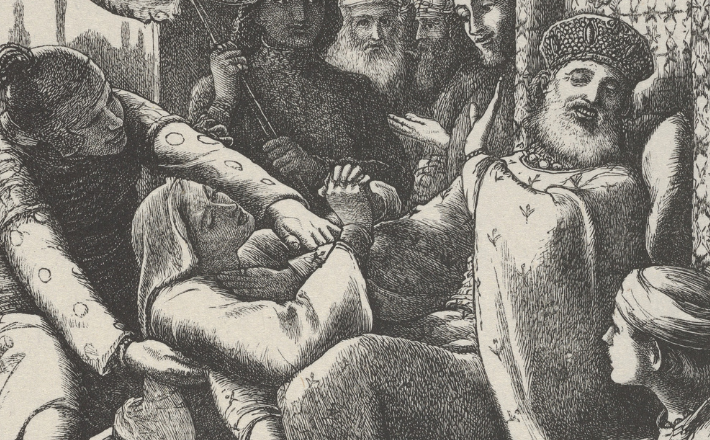Commentary on Luke 18:1-8
Parables work because the comparisons they make stop the hearer short. The comparisons might, at first hearing, ring dissonantly. The parables so often are shocking to Jesus’ first hearers. “Can it be?” the parables make us wonder. “Is that really what the kingdom is like?” And in the midst of wonder and confusion lies the power of these storied comparisons.
The context of this week’s parable is the immediately preceding teaching on eschatology and the dawning of the reign of God. Prompted by a question from certain Pharisees about the timing of the kingdom’s advent (17:20), Jesus reimagines the query. The kingdom is not about time. It cannot be pointed out. It is not even something to be seen. The kingdom is to be felt and experienced. Jesus concludes, “The kingdom of God is among you” (New Revised Standard Version Updated Edition). The kingdom can be discerned where the faithful gather.
Another translation is that Jesus promises that the kingdom will be “within you,” that the kingdom reigns in the hearts of believers who, in their sojourn through this tattered world, bring God’s life in their wake.
This encouraging conclusion leads to a long and potentially troubling eschatological reflection (17:22–37). Like the days before the flood, the world will seem to be continuing as it ever has until the kingdom intercedes. Persecution and travail will come, but so will life persist after we have lost everything (17:33). The urgency of the kingdom’s transformation is stark as chapter 17 closes.
“Then Jesus told them a parable about their need to pray always and never lose heart” (18:1).
This is a parable many of us need these days! In a world teeming with disappointment and hopelessness, I turn to the beginning of chapter 18, yearning for a refreshing word. Instead, Jesus narrates a parable about the kind of everyday corruption that marginalizes those who can least afford it. It is a surprising parable to tell if Jesus’ aim is to encourage prayer and persistence.
Perhaps those parables most familiar to us and our congregations have lost some of their persuasive power as their endings and aims seemingly become evident to us. Less so when we are confronted by this strange and unrelenting parable about a judge who mocks God’s justice and disdains those who come seeking justice before him.
There are two characters in Jesus’ parable. The first is an unjust judge, the mirror image of justice we hope for when someone wields so much power over his neighbors. The second is a widow. While widows in the ancient world could wield power and wealth,1 the unnamed widow here likely represents someone without the political and economic clout the judge can wield. Her power instead is her persistence. She troubles the judge in her insistence that she receive justice in a case the parable does not describe. Indeed, as readers, we side with her not because we know the details of her case but because of the character of the judge who neglects his obligations to justice. Because the widow will not relent, the judge does.
An alternative translational option in verse 5 creates yet another possibility of the power she might yield over the judge. The judge may fear not just further annoyance but a slap in the face! Left without another resort, the widow may resort to personal violence, the judge fears. He may also fear losing face, so to speak.
The primary interpretive and homiletical obstacle here is an error we preachers frequently make in the interpretation of parables. We tend to allegorize parables so that our assumptions about God are mapped in problematic ways. That is, we too often tend to search out the most powerful figure in the parable, the richest person, and associate their behavior and ideas with God. The mistake here would be to link the judge’s corruption and God’s character. The comparison here cannot and must not highlight the judge.
Two other options are before us. The first is suggested by Jesus in his interpretation of the parable starting in verse 6. Listen to the judge, he exhorts, but take one further step. If even this corrupt judge can be made to listen to the appeals of the aggrieved, how much more will a God who reigns with justice, who loves with grace, listen “to his chosen ones who cry to him day and night” (verse 7). God is not like this judge at all, and neither does God answer our prayers as a concession. God receives our supplications with love, answers them with care.
The second possibility is for us to focus not on the faithless judge but on the faithful widow. Her persistence in a broken system is a model for us to follow, knowing as we do that God’s economy of grace is not ruled by the whims of a judge. Her persistence is an emblem of faithfulness. Her boldness is rewarded. Her courage to draw upon the seemingly meager “weapons of the weak”2 in a system that would sideline her and deny her justice is a path to follow as we await our deliverance. Perhaps this is precisely the kind of faith Jesus wonders if he will find on his return (verse 8)—a faith that demands justice in a world coursing with injustice, a faith that persists in seeking life even in systems seemingly ruled by the forces of death, a faith that looks to God’s promises and lives as if they will be fulfilled today.
Notes
- See Susan Hylen, Women in the New Testament World (Oxford University Press, 2019), 65–92.
- A vivid phrase coined by James C. Scott in Weapons of the Weak: Everyday Forms of Peasant Resistance (Yale University Press, 1987).


October 19, 2025